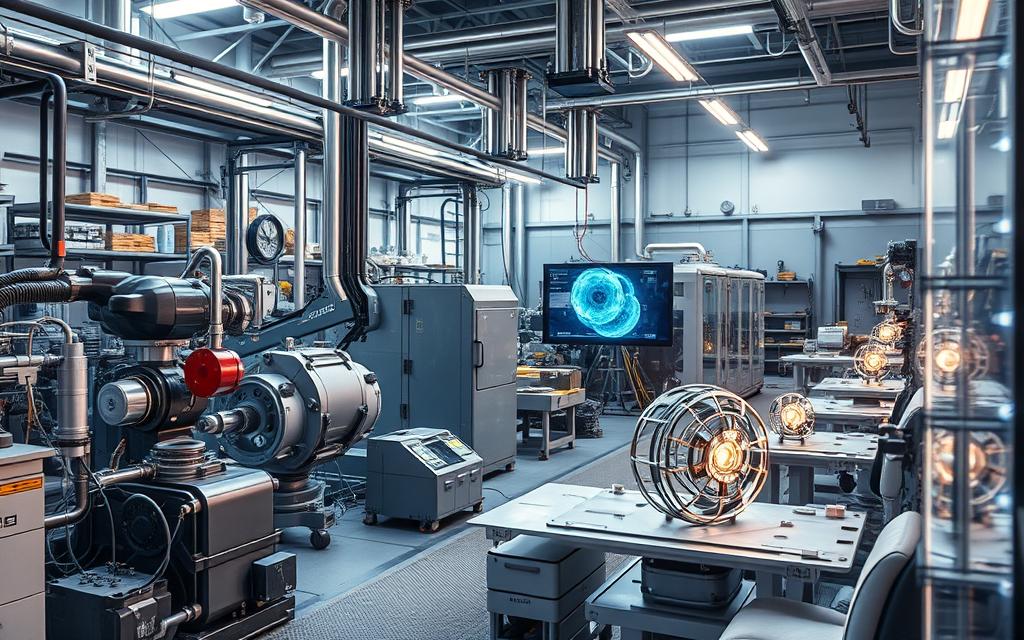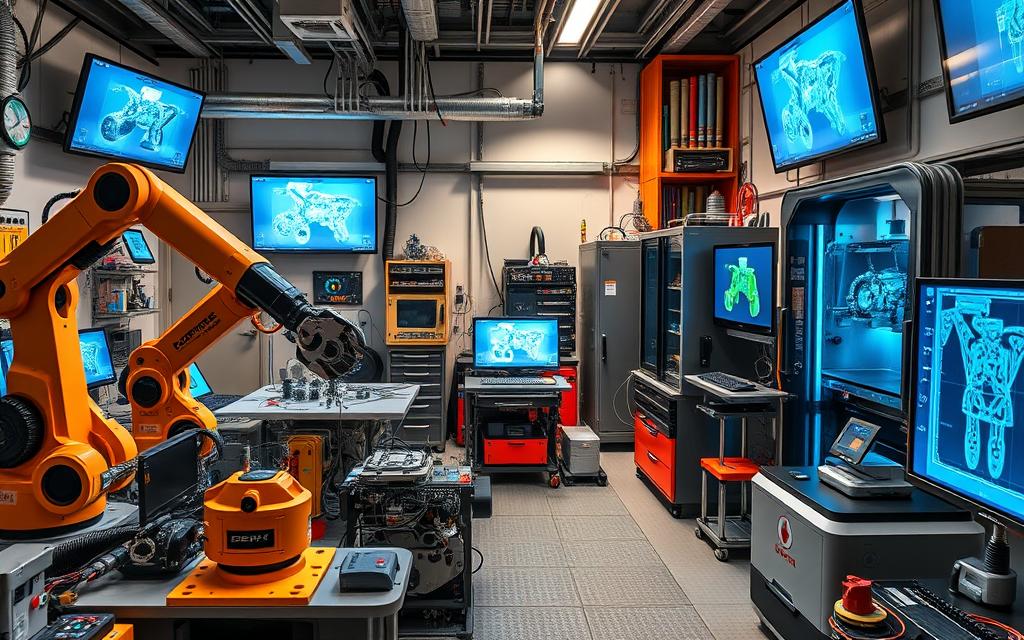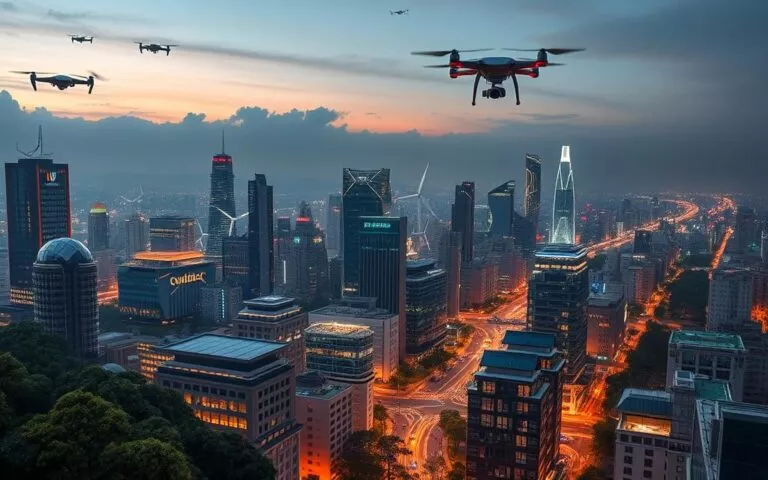How Technology Has Transformed Mechanical Engineering
Mechanical engineering is changing fast, thanks to new technology. The impact of technology in engineering is huge. Mechanical engineers are now using innovative solutions for today’s problems. They are using artificial intelligence (AI), automation, and new materials. These technologies help engineers create a better and more efficient future.
The United States Bureau of Labor Statistics says mechanical engineers will be more in demand. They expect a 10% increase from 2022 to 2032. This is because engineers now need to understand and use new technologies. They need to know how these technologies can be part of their work every day.
AI is making a big difference in the field. It’s making things more efficient and sustainable. Companies are using AI to make their processes better and design better products. A 2019 survey by Deloitte showed that 83% of companies saw the benefits of AI. They think AI will bring great value soon. This shows how new technology is changing engineering. It’s also preparing for future breakthroughs.
If you want to learn more about how mechanical engineers use new technology, check out this article. It talks about the role of mechanical engineers in emerging technologies.
Introduction to the Role of Technology in Mechanical Engineering
Technology has greatly changed the field of mechanical engineering. We’ve moved from old ways of making things to new, innovative methods. Now, mechanical engineers use modern tools to improve their work and create new solutions. This shows how important technology is in this field.
The Evolution of Mechanical Engineering
Mechanical engineering has grown a lot since it started. It began with simple tools and machines. Then, computer-aided design (CAD) changed everything, making design work much more precise and quick. As time went on, more advanced manufacturing techniques were developed. This allowed for the making of complex items. Technology has made a big impact on how projects are done, how costs are managed, and what can be designed.
Importance of Emerging Technologies
Emerging technologies are becoming more important in mechanical engineering. Robotics, automation, and artificial intelligence are changing how things are done. They make work more efficient, more accurate, and cheaper. For instance, using sensors with robots has improved work in warehouses and clean-up projects. As these technologies get better, it’s vital for mechanical engineers to work with other fields. This teamwork helps tackle big challenges in many areas while sticking to important ethical rules.
| Technology | Contribution to Mechanical Engineering | Impact |
|---|---|---|
| CAD Software | Facilitates precise design and analysis | Reduces time and costs |
| Robotics | Enhances automation and operational efficiency | Improves productivity in various sectors |
| Artificial Intelligence | Optimises design and manufacturing processes | Increases accuracy and reduces errors |
| Data Analytics | Provides insights for decision-making | Optimises resource management |
| Additive Manufacturing | Reduces material waste | Enables complex design creation |
| IoT | Allows predictive maintenance | Reduces downtime and costs |
How Has Technology Changed Mechanical Engineering
Technology has greatly changed mechanical engineering, making work different for professionals. It has brought in artificial intelligence, robotics, and automation. These changes have made work more efficient and changed what mechanical engineers do today.
Integration of Artificial Intelligence and Machine Learning
Artificial intelligence has become key in modern mechanical systems. AI makes machines smarter, enabling them to predict maintenance needs and optimise operations. This means equipment can be monitored in real time. So, there’s less downtime and work is smoother, helping to meet production goals.
Advancements in Robotics and Automation
Robotics have transformed how mechanical engineering is done, especially in manufacturing. Now, advanced robots work on assembly lines, in dangerous places, and even in healthcare. These robots boost productivity and reduce the risks of manual work. Humans get to do more important tasks. Also, collaborative robots, or cobots, have started a new phase of teamwork between people and machines, making work more effective across different areas.
Impact on Design and Manufacturing Processes
Technology has also changed how mechanical engineers design things. With new simulation tools and 3D printing, prototyping is quicker, allowing for more complex designs and speedier testing. This shift means manufacturing is less costly and time-consuming, leading to more inventive product development. Engineers can now better address challenges, keeping up with a market that changes fast.
The Influence of Advanced Materials in Mechanical Engineering
Advanced materials are key in mechanical engineering’s progress. They let engineers break new ground in design. This makes products more efficient and green. We will look at types of advanced materials and how they’re used. We’ll also discuss the benefits of advanced materials in this field.
Types of Advanced Materials
Mechanical engineering now often uses advanced materials. Here are some important kinds:
- Graphene: It’s very strong, flexible, and conducts electricity well. Graphene is changing many areas of engineering.
- Metamaterials: They have special properties like bending light oddly. This is because of how they’re made on a tiny scale.
- Shape Memory Alloys (SMAs): After they’re bent, SMAs can go back to their first shape. They’re great for moving parts in planes.
- Carbon Fiber Reinforced Polymers (CFRPs): They’re strong yet light, and don’t rust. That’s why cars and planes often use CFRPs.
Applications and Benefits of Using Advanced Materials
The use of advanced materials brings many advantages. They’re important in several fields:
- Aerospace: Using strong and light composites makes planes use less fuel and become safer.
- Automotive: Cars can perform better and pollute less with new materials.
- Renewable Energy: These materials help make energy systems more efficient. This means less harm to the environment and supports smart engineering.
These materials help create systems that are more dependable. They meet today’s engineering challenges well. With more digital tools and Industry 4.0, using advanced materials will improve how we make things and manage their lifecycles.

Sustainability and Renewable Energy Solutions
Mechanical engineers have greatly improved sustainability in recent years. They lead the way in renewable energy, aiming for a cleaner, more sustainable future. They work on wind, solar, hydroelectric, and geothermal energy. Reducing dependency on fossil fuels and improving global energy efficiency are their goals.
Mechanical Engineering Impact on Renewable Energy
Mechanical engineers are crucial in developing renewable energy. In the U.S., renewable energy made up 17% of electricity in 2017. Wind energy is a key part of this. By 2019, 4% of mechanical engineering jobs were in renewable energy. This shows a strong job market in sustainability.
Innovations in Energy Storage and Efficiency
Innovative energy storage, like batteries and pumped-hydro systems, helps use renewable energy better. In 2017, pumped-hydro was 95% of the U.S.’s large-scale renewable storage. However, the national grid’s small storage capacity poses challenges. Mechanical engineers work on materials and systems to increase energy output and reduce loss. This includes focusing on hydrogen fuel cells and better batteries.
Mechanical engineers are key to tackling climate change. California wants 50% clean energy by 2026, raising the demand for sustainable methods. Through research and innovation, these engineers are essential in fighting climate issues and encouraging sustainability.
| Year | U.S. Renewable Energy Generation (%) | Job Postings in Renewable Energy (%) |
|---|---|---|
| 2016 | 24 | N/A |
| 2017 | 17 | N/A |
| 2019 | N/A | 4 |
Mechanical engineers’ work in sustainability and energy storage is key to global sustainability aims. Their efforts ensure a future that meets demands for resilience, efficiency, and ecological welfare. To learn more about their role in sustainable development, visit this resource.
Conclusion
The future of mechanical engineering is deeply tied to the evolution of technology. Emerging tech like artificial intelligence and IoT are changing the game. Mechanical engineers must now adapt their skills to these new challenges. This shift not only makes processes better but also opens up new chances for innovation in areas like manufacturing, aerospace, and healthcare.
There’s also a big push for sustainable engineering. Professionals are now focusing on sustainable design. They’re looking into renewable energy and new materials that are good for the planet. For example, advancements in 3D printing are changing industries by reducing waste and speeding up how fast things are made, especially in aerospace and healthcare.
In conclusion, new technologies bring challenges and opportunities for mechanical engineers. By embracing these changes, the field will redefine its role, promote sustainability, and meet the world’s needs. Staying ahead of innovation is key for engineers as they navigate a more complex world.
FAQ
How has technology transformed mechanical engineering?
Technology has changed mechanical engineering greatly. It has brought in artificial intelligence, automation, and advanced materials. These changes boost efficiency and competitiveness.
What are some key emerging technologies in mechanical engineering?
Some emerging technologies are artificial intelligence, machine learning, robotics, and advanced simulation tools. They help with maintenance, improve manufacturing, and better product design.
Why is the integration of artificial intelligence important in mechanical engineering?
Artificial intelligence is crucial as it changes how we do predictive maintenance. It allows real-time monitoring of equipment. This improves efficiency and reduces downtime in factories.
What impact do advanced materials have on mechanical engineering practices?
Advanced materials make a big difference. They help create lighter, more efficient, eco-friendly products. This is important in the aerospace, automotive, and renewable energy sectors.
How does mechanical engineering contribute to sustainability and renewable energy?
Mechanical engineering is key for sustainable designs and system optimisation. Engineers work on solar, wind, and geothermal systems. They develop energy storage solutions for better use of renewables.
What future challenges do mechanical engineers face with technological advancements?
Mechanical engineers must keep up with fast-changing technologies. They need to improve their skills to use new advancements well. They aim to meet society’s needs and protect the environment.









